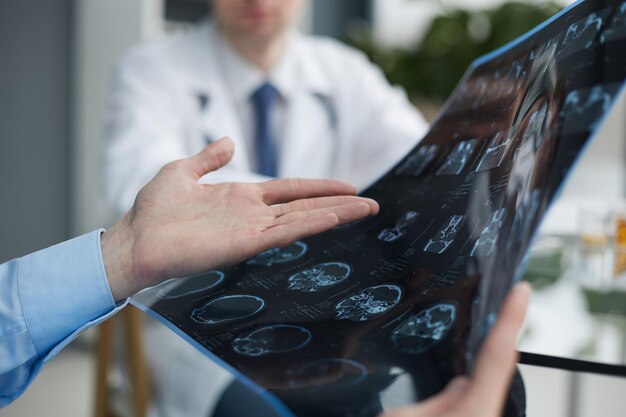Navigating Dementia Diagnosis: What You Need to Know
Understanding the complexity of diagnosing dementia can be daunting, especially when you're trying to make sense of the symptoms affecting someone you care about. With more than 55 million people living with dementia globally, it's crucial to have a comprehensive grasp of how health professionals diagnose this condition. Although dementia primarily affects older adults, it's important to remember that it is not a normal part of aging.
What makes diagnosing dementia challenging is the sheer variety of its symptoms and the plethora of conditions that can mimic its effects. Let's dive into the intricate process of diagnosing dementia, helping you gain insights that empower informed conversations and decisions with your healthcare provider.
What is Dementia?
Before discussing how dementia is diagnosed, it's helpful to clarify what dementia actually is. Dementia is an umbrella term used to describe a range of neurological conditions affecting the brain and leading to cognitive decline. It impacts various facets of mental functioning, including memory, reasoning, and behavior.
Different Types of Dementia
Dementia manifests in multiple forms, with Alzheimer's disease being the most common. Other types include:
- Vascular Dementia: Often resulting from stroke or blood vessel blockages.
- Lewy Body Dementia: Noted for symptoms like fluctuation in alertness and hallucinations.
- Frontotemporal Dementia: Primarily affecting behavior and language due to frontal and temporal lobe degeneration.
Recognizing these diverse types is pivotal, as each requires a tailored diagnostic approach.
Recognizing Early Symptoms
Dementia doesn't happen overnight. It's a gradual process that starts with mild symptoms, often subtle and easily overlooked. Early signs may include:
- Memory lapses that disrupt daily life.
- Difficulty planning or solving familiar problems.
- Confusion with time or place.
- Trouble understanding visual images and spatial relationships.
- Withdrawal from work or social activities.
Identifying these symptoms at their inception is crucial, as early diagnosis can lead to better management strategies.
The Diagnostic Process: A Comprehensive Approach
Medical History and Physical Examination
The first step in diagnosing dementia involves gathering detailed medical history and conducting a physical examination. A healthcare professional will assess any noticeable cognitive changes, medical conditions, medications, and family history of dementia. Physical exams help rule out other explanations for symptoms, such as strokes or infections.
Cognitive and Neuropsychological Testing
Standardized cognitive tests, such as the Mini-Mental State Examination (MMSE) or the Montreal Cognitive Assessment (MoCA), evaluate memory, problem-solving skills, and other cognitive abilities. These tests serve as a crucial baseline to identify the degree of cognitive impairment.
Neuropsychological tests delve deeper, providing a more comprehensive understanding of cognitive strengths and weaknesses, which aids in distinguishing between different types of dementia.
Laboratory Tests
Blood tests and other lab tests are not used to diagnose dementia, but they help eliminate other potential causes for symptoms. Conditions like vitamin deficiencies, thyroid problems, or infections can all produce dementia-like symptoms.
Brain Imaging
Brain imaging plays a critical role in the diagnostic process:
- CT Scans and MRI Scans: These imaging tests identify brain shrinkage, tumors, or strokes that might explain cognitive decline.
- PET Scans: Useful in detecting amyloid plaques or tau protein tangles often seen in Alzheimer's disease. PET scans are emerging as powerful diagnostic tools, offering insights into the brain's biological activity.
Exploring Genetic Factors
While most dementia cases are not hereditary, genetic tests can provide insight, especially if there is a strong family history of the condition. For example, the APOE-e4 gene test can suggest an increased risk for Alzheimer's but isn't definitive on its own.
Making Sense of the Diagnosis: What's Next?
Receiving a dementia diagnosis can be emotionally overwhelming, but it also marks the beginning of a journey toward understanding and managing the condition effectively.
Importance of Early Detection
Early detection allows for timely interventions, including lifestyle adjustments, therapeutic strategies, and potential participation in clinical trials. It also gives families the opportunity to plan for future care needs.
Treatment Options
While there's no cure for dementia, several treatment options aim to manage symptoms and improve quality of life:
- Medications: Drugs like cholinesterase inhibitors and memantine may help manage symptoms in certain types of dementia.
- Therapies: Cognitive stimulation, occupational therapy, and support groups can aid in maintaining cognitive function and managing behavioral symptoms.
Lifestyle Modifications
Making beneficial lifestyle changes can play a pivotal role in managing dementia:
- Regular Physical Activity: Exercise supports brain health and overall well-being.
- Healthy Diet: A diet rich in fruits, vegetables, whole grains, and lean proteins benefits brain function.
- Social Engagement: Staying socially active can help slow cognitive decline.
Navigating the Emotional Landscape
Dementia diagnosis affects not only the individual but also family and friends. Addressing the emotional impact and coping mechanisms is crucial.
Support Systems
Support groups for both patients and caregivers offer a crucial network, sharing experiences and strategies for daily challenges.
Long-term Planning
Considerations for long-term care and legal planning become essential after a diagnosis. Discussing options with healthcare professionals or legal advisors helps prepare for future needs and decisions.
Looking Ahead: Embracing a Supportive Path
Although the path through dementia is complex, gaining a comprehensive understanding of the diagnostic process can provide clarity and direction. Early detection, combined with a collaborative approach involving healthcare professionals, caregivers, and support networks, empowers you to make informed choices that can significantly impact quality of life.
📌 Key Takeaways:
- Understand Early Symptoms: Recognizing early signs like memory lapses or confusion is vital.
- Comprehensive Diagnosis: Diagnosis involves medical history, cognitive tests, lab tests, and brain imaging.
- Lifestyle Adjustments: Engage in regular physical activity, maintain a healthy diet, and stay socially active.
- Seek Support: Utilize support networks and discuss long-term care plans with professionals.
- Empowerment Through Knowledge: Understanding options and remaining informed aids in managing dementia effectively.

Related Articles
